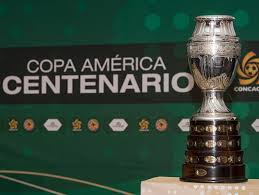By Paul Nicholson in Miami
May 2 – The unveiling of the Copa America centennial tournament to be played in the US and hosted by CONCACAF June 3 to June 26, plants a huge new football tournament right in the middle of what is already a packed sporting calendar with UEFA’s 2016 European Championships in France and the 2016 Olympics in Rio.
The tournament will be the biggest international sports event to be held in the US since the Winter Olympics in Salt Lake in 2002 and the FIFA World Cup in 1994.
CONCACAF president Jeffrey Webb said in his remarks at the launch that the Copa America, the world’s oldest international football tournament, “established the blueprint of what we now call international competition”. With the combining of the two confederations for this one tournament that blueprint has evolved to a whole new level, 100 years after its birth.
Webb confirmed that the tournament will be in the FIFA calendar, but there was no commitment to the format for future editions. At the same time the suggestion was not dismissed outright either.
CONMEBOL president Eugenio Figueredo similarly said that he hoped FIFA would integrate the competition into the international calendar.
The tournament scheduling raises questions for the Europeans who will have their traditional football dominance of the middle year between World Cups challenged for the first time by what will be a powerful competitor for TV viewers and commercial partners.
Webb told INSIDEworldfootball: “We recognise there is a small overlap (with the Euro 2016 championship) in the last part of the tournament, but 100 years is special and has to be celebrated.”
Integration into the FIFA calendar would make player release from clubs mandatory, meaning that Americas players at European summers could find themselves playing into three consecutive summers with the World Cup this year, the Copa America in Chile in 2015 and now the Copa America Centennario in the US in 2016.
UEFA will likely complain of fixture congestion and player burn-out.
But the challenge for the Europeans from the ‘new’ world is not just over tournament scheduling.
The commercial challenge will be also significant. The footballing challenges on the pitch will be matched by the commercial battles off it as the two tournaments go head-to-head in the Asian markets in particular for broadcast and commercial revenues. Ultimately there is only so much television and sponsorship money to go round from what is really a limited pool of global sponsors.
It is inevitable that the attraction of a ‘new world’ first ever tournament uniting the Americas with Argentina, Brazil, Colombia et al in their full pomp, will be a compelling sales story and challenge to the ‘old world’ Euros (though newly expanded to its 24 team format).
For fans the comparison of who is better – Europe or the Americas – is an inevitable comparison. And where they go, the commercial revenue follows.
Commercial rights are being handled by newly fomed wematch, a recently constructed partnership between three international leaders in the soccer industry, Full Play, Torneos and Traffic Sports. Now harnessed as one unit to market the rights for this competition they will be a formidable force up against UEFA’s fledgling CAAEleven representatives.
Webb said that of course the commercial aspects are exciting for member associations, and significant. While the rights are held by CONMEBOL, CONCACAF will share in the revenue, though Webb would not be drawn on the percentage split – though it won’t be 50/50 for the obvious reason that there will be 10 CONMEBOL teams and six from CONCACAF.
These are early days in understanding the significance that this new competition could bring in 2016 edition. Certainly it has broken the mould of the old and accepted world order of competition and provided a challenge to UEFA’s Euro championship model.
The Local Organising Committee will be announced within the next two weeks. Then the work will begin on talking to cities and stadia to bid for host status.
Webb tells that story that when he was elected president of CONCACAF in Budapest in 2012 his first meeting was with his executive committee. His second was with CONMEBOL. “There is a lot of hard work to make this (tournament) become a reality. We have done it in two years but I understand why it has taken 100 years to bring the Americas together,” he joked.
Joking aside, a major new international football initiative has been undertaken with the potential to shift some of the balance of power away from the old world to the new. At this stage it would be foolish to underestimate the significance of this.
Contact the writer of this story at moc.l1745121392labto1745121392ofdlr1745121392owedi1745121392sni@n1745121392osloh1745121392cin.l1745121392uap1745121392

